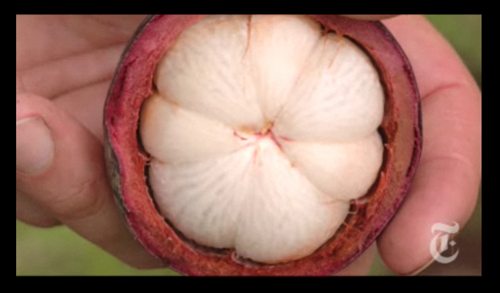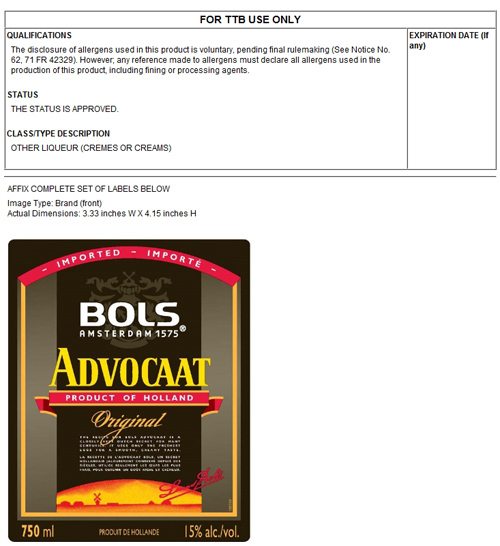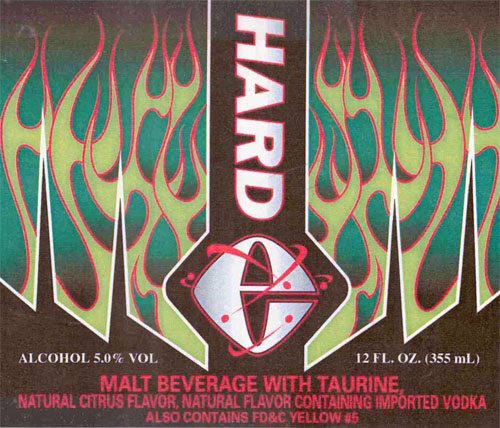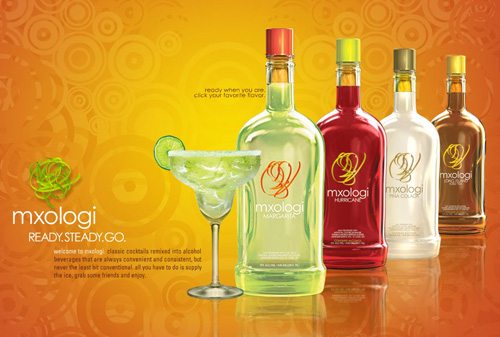These beer products look a lot like spirits, don’t you think? They have a spirits-related brand name, common cocktail names, spirits-shaped bottles and an alcohol content that is high for beer. The website goes so far as to describe the first one as a “traditional margarita.” The other versions are Hurricane, Pina Colada and Long Island Iced Tea. In a bout of writing that would not make Don Draper proud, the Pina Colada back label would have you believe this product, going for a few bucks per bottle, is the next best thing to having your own island. If so, I wouldn’t want to draw whatever is third best. Perhaps mxologi is an Anheuser-Busch response to the very successful line of malt beverages under the Smirnoff name. After all, the Smirnoff products certainly suggest spirits, and also happen to be made with sucralose.
Continue Reading Leave a Commentingredients
Mangosteen and Mace

In the last post, we showed a pineapple wine from Radee. As in the image above, Radee also imports a wine fermented from mangosteen. The New York Times has a good introduction to the mangosteen in this video. It features an ethnobotanist and explains that this fruit was banned from the United States until a few years ago. In other unusual ingredients, a Cooperstown, New York brewer makes an ale with mace, among other spices such as grains of paradise. Mace is similar to nutmeg but is not the same. The nutmeg tree is the source of both spices and is one of very few plants that produce more than one spice; nutmeg comes from the tree’s seed and mace comes from the seed’s cover. Ommegang’s Adoration Ale also features coriander and cardamom according to the label, and cumin according to the website.
Continue Reading Leave a CommentTags: ingredients
Pineapple Wine

Here is wine made from pineapples, rather than grape wine with pineapple flavor. The above wine is produced and bottled by Florida Orange Groves of St. Petersburg, Florida. A second example is made in Thailand and imported by Radee Wine of Sacramento, California.
Continue Reading Leave a CommentTags: ingredients, speaks for itself
Advocaat

This fine product has eggs on the label, and in the bottle, so it comes equipped with an allergen qualification, on the approval. The above qualification says:
The disclosure of allergens used in this product is voluntary, pending final rulemaking (See Notice No. 62, 71 FR 42329). However; any reference made to allergens must declare all allergens used in the production of this product, including fining or processing agents.
And it is a harbinger of the allergen fun that is soon to commence. Soon, allergen disclosures will be mandatory on beer, wine and spirits. There is not much on the web or in the rules to explain how Advocaat should be made and where the name comes from, but the Bak’s label does a pretty good job. It explains that Bak’s Advocaat is made with potato spirits, egg yolk, sugar, vanilla and a bit of brandy.
Continue Reading Leave a CommentTaurine

Taurine has been widely used in alcohol beverages for about ten years. One of the early approvals is Hard E Malt Beverage with Taurine, as above. Another early example is Sparks with Caffeine, Taurine, Guarana and Ginseng, from a few months later. Taurine showed up in TTB/ATF products around 2001, a few years after Red Bull hit the US. Red Bull famously contains taurine as well as caffeine and B vitamins. Some, like CSPI, have said taurine is of dubious legitimacy in food, but this article points out that Red Bull sells the beverage, with taurine, in well over 130 countries. The US of course is among those countries and there is no big sign of FDA concern. France had banned Red Bull with taurine for many years but began allowing it in April of 2008. On this occasion, the company said:
Last year alone, over three and a half billion cans and bottles of Red Bull energy drink were consumed in over 143 countries across the world and no one anywhere has ever shown any link between [the product] and harmful effects. Red Bull could only have such global sales because health authorities across the world have concluded that [it] is safe to consume.
The term is derived from “taurus,” Latin...
Continue Reading Leave a CommentTags: ingredients, policy
Beer with Garlic

Here is Jessenhofke beer “brewed with garlic.” It is not the only one. Here is another. The Belgian label is also noteworthy because it has a detailed ingredient list.
Continue Reading Leave a CommentTags: ingredients, speaks for itself, unlikely combinations, would you drink it?


